PENNY DREADFUL, SEASON TWO:
CRISIS OF FAITH
by Thomas M. Sipos,
managing editor [December 20, 2020]
[HollywoodInvestigator.com] In the second season
of
Penny Dreadful, feminism, sexual liberation, political
correctness, secularism, drug addiction, and religious syncretism
expand their influences. Some events in Season Two seem to be an
attempt to graft modernity onto Christianity as if they were
compatible, even symbiotic. But one can
instead interpret these events
as modernity's efforts to assault, corrupt, and undermine
Christianity.
We last saw Ethan Chandler (Josh Hartnett) transform into a werewolf
as two Pinkerton agents were arresting him. He now awakes in the
Mariner's Inn, surrounded by savagely torn corpses. In Season One,
London was plagued by such murders. It was suggested that Jack the
Ripper had returned. Sir Malcolm Murry (Timothy Dalton) suspected
vampires, until a police inspector explained that the bodies were
not drained of blood. We now know that Chandler, in werewolf form,
is the culprit.
As Chandler tells Vanessa Ives (Eva Green) that he must leave England,
their carriage is attacked by monsters: red, bald women, branded with
pentagrams. Vanessa scares them off by snarling a strange language.
The Verbis Diablo. The devil's
tongue. The monsters, she later explains, were not the vampires of
Season One. These creatures are Nightcomers. Witches.
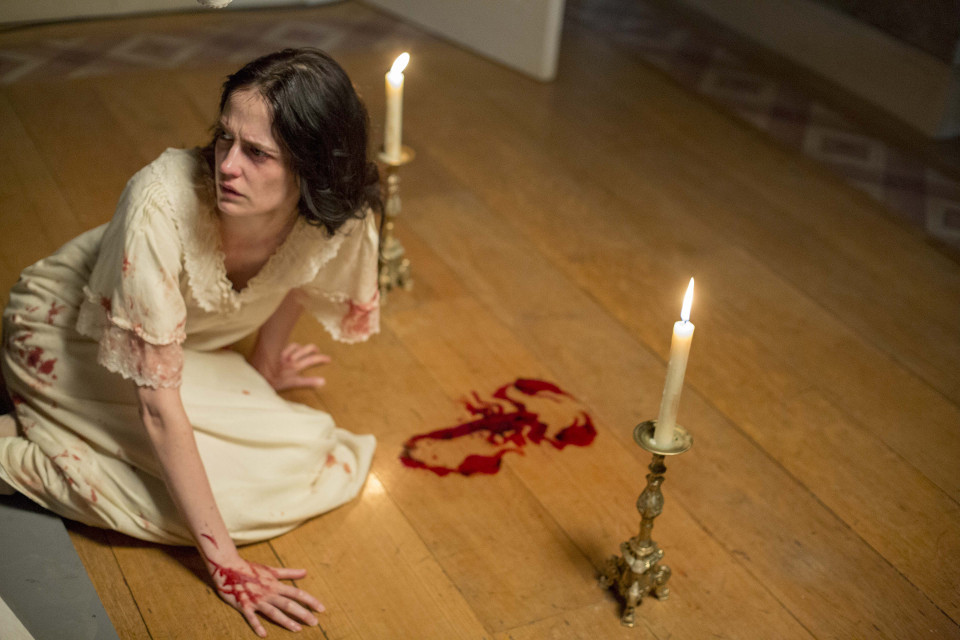
As with Season One's opening, Season Two's first episode finds Vanessa
praying fervently before a crucifix. But the Nightcomers have so
frightened her that, this time, she first draws a scorpion on the
floor, in her own blood. She is practicing religious syncretism,
incorporating "pagan glyphs" into her Catholic prayers. She sees no
conflict, imagining that "white witchcraft" will reinforce Christian
grace, adding an extra layer of protection against the Nightcomers'
Satanic witchcraft.
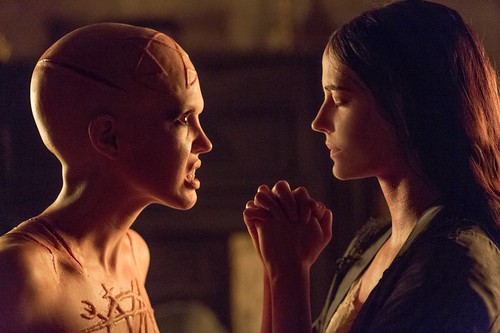
Vanessa thinks her scorpion glyph will repel the Nightcomers. Yet they
torment her while she prays. She later cries, "They were here. No,
they weren't here. I can't tell anymore. I thought I saw them but they
weren't there. I can't tell the difference whether they're real or in
my head. I can't live with this anymore. But they're in my prayers
now. Even my prayers aren't safe."
Why is that? Are Nightcomers so powerful that they can overcome "good
witchcraft" and Christianity combined? Or does practicing the
former lessen the grace granted by the latter? Is Vanessa's syncretism
a sin that only welcomes the Nightcomers further in? Or, as with Job,
does God allow the Nightcomers to torment Vanessa to test her faith?
As Vanessa insists, and events will prove,
"God has a plan."
Season One established that Vanessa has psychic powers. She reads the
tarot. She made mental contact with the vampire Mina. Now we see
Vanessa practicing witchcraft. In a flashback episode -- "The
Nightcomers," a critical dramatic and thematic turning point in the
series -- we learn how Vanessa developed her powers and first
met the Nightcomers.
After her release from the Banning Clinic, but before joining Sir
Malcolm in London, Vanessa tried to learn why she was
different. She visited Joan Clayton (Patti LuPone), a woman
known as The Cut-Wife of Ballentree
Moor. "You know why they call me that? Because when the
girls need a little baby killed inside them, they come to me. I cut it
out. Cut-Wife. Fetching name, you think?"
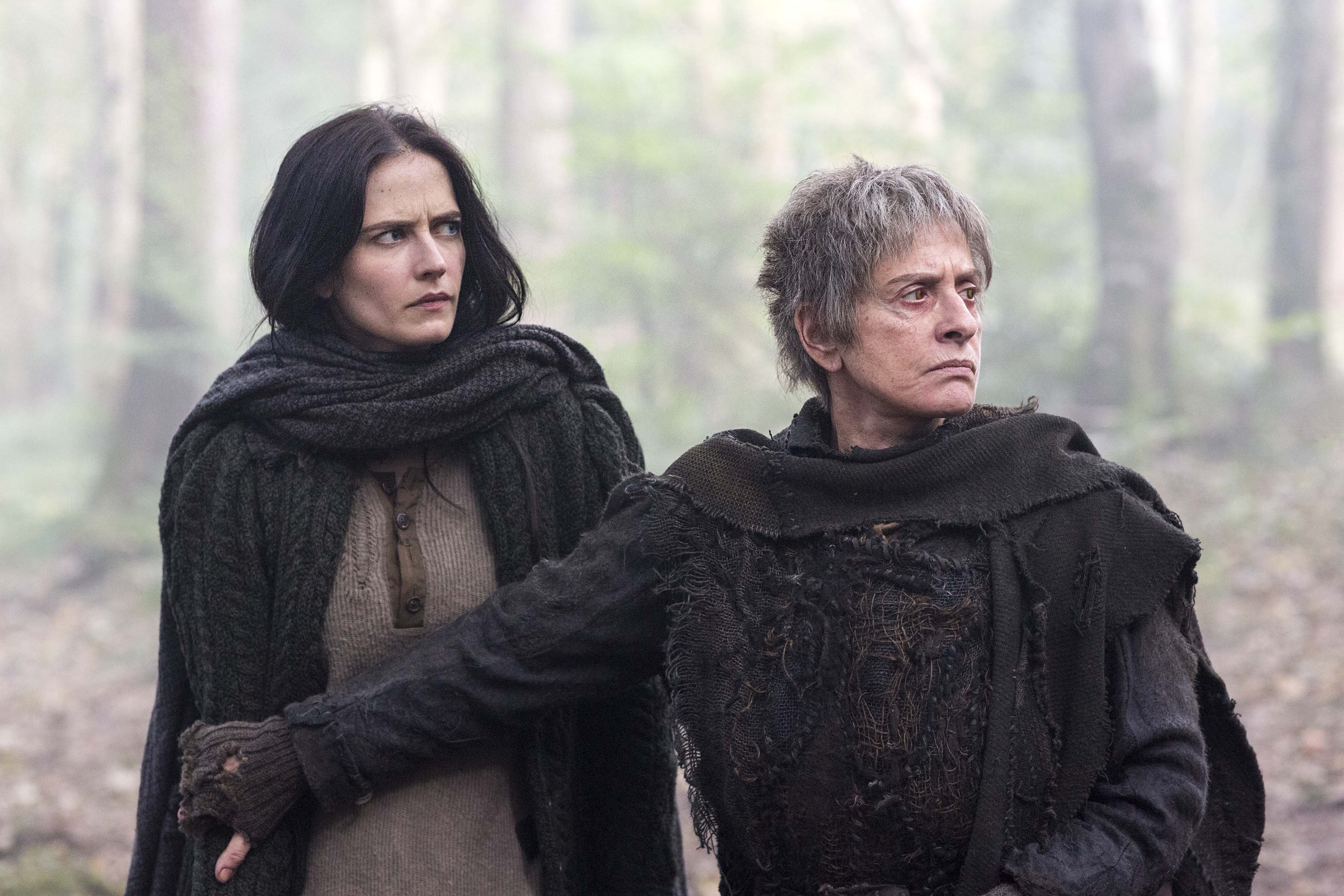
Clayton is a Daywalker; a "good witch." Centuries ago, she belonged to
a coven led by her sister, Kali (Helen McCrory). (The same Madame Kali
who led the
seance in Season One.) When the coven sold their souls
to Satan, becoming Nightcomers, Clayton refused. The coven stayed
young and beautiful; gifts from Satan. Clayton grew old and crotchety.
Clayton also practices syncretism. Her cottage on the moors displays
both pagan totems and Christian crosses. And a book of Satanic magic.
"The poetry of death. If ever the day comes when my little scorpion is
crushed and beaten, if her God deserts her completely, only then does
she open it. And on that day, she will never be the same. She will
have gone away from God. Forever."
"Little scorpion" is Clayton's
term of affection for Vanessa.
"You're strong willed and agile, like the scorpion." Vanessa
accepts the scorpion as her totem. Like a witch's familiar. A
protector. It's why she draws a scorpion, in her own blood, when
praying to Christ.
Clayton teaches the Verbis Diablo to Vanessa, but warns against using
it too often. "If you believe in God, better you pray with all you
got in you. Only if all else fails, you speak the Devil's tongue. But
mark, girl, it's a seduction. And before you can blink twice, it's all
you can speak. And so does a Daywalker become a Nightcomer."
Clayton regards Satan as a last resort. In case of emergency, break
glass. She's a pagan witch who enlists both Christ and Satan. You
can't get more syncretistic than that.

She teaches Vanessa about the tarot, and herbs, and spells. Vanessa
helps Clayton perform an abortion on a village girl. Although she
knows it's wrong, Vanessa shows no hesitancy. She comforts the girl.
"God forgives all." Thus does Vanessa encourage the girl in the
Sin of Presumption; committing a sin (rather than resisting) because
one expects forgiveness.
Thus is feminism's creed of self-empowerment and individual choice
corrupting Vanessa's Catholicism. Clayton asks Vanessa to stay and
continue her work after she dies. "Ballentree Moor is a poor
forgotten place, with many girls who need help. This place needs its
cut-wife." Yet despite her compassionate appeal, Clayton has more
love for humanity than for humans. "The peasants! Pay me little for
my craft. Fuck them. Worse than animals."
In this, she is like many modern
progressives. And like progressives, Clayton accuses Christians
of hypocrisy. "They send their girls to me, but for this very
service they despise me. So it is always for those who do for women."
Overall, Clayton seems to represent an "inclusive" progressive
spirituality, in contrast to an "intolerant" patriarchal Christianity.
"Old as I am, I know nothing. Why people in this world hate what is
not them. Why they fear all they don't know."
Well, perhaps it's because some things man was not meant to know.
"The secret things belong to the Lord."
(Deuteronomy 29:29)

One night, Kali comes to Clayton, demanding that she hand over
Vanessa. Satan still seeks Vanessa to be Amunet to his Amun-Ra.
Clayton refuses. So Kali turns to Sir Geoffrey Hawkes (Ronan Vibert),
a wealthy landowner who wants to annex Clayton's land to his estate.
Sir Geoffrey is less a character than a parody of "the patriarchy."
Rich, cruel, arrogant. A religious hypocrite who publicly champions
the local priest, yet privately submits to Kali in sadomasochistic sex
rituals. He also tries to rape Vanessa.
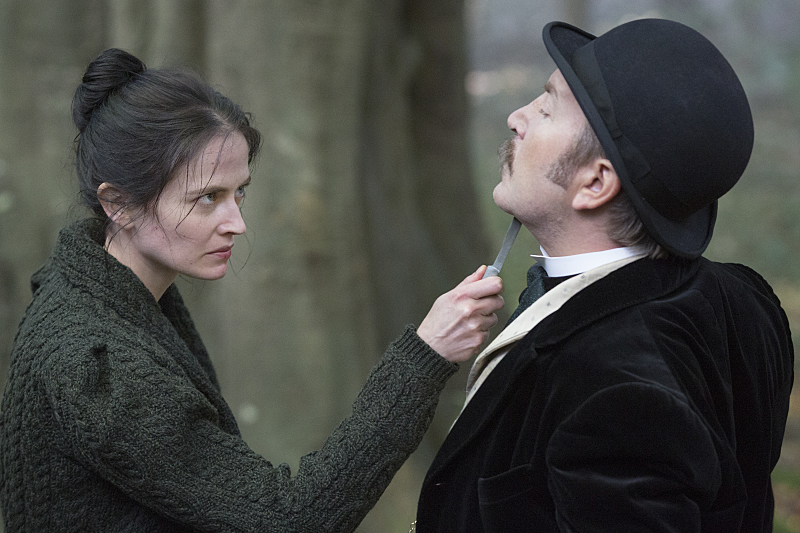
"The Nightcomers" ends on a ridiculously heavy-handed note.
Manipulated by Kali, Sir Geoffrey, the parish priest, and a
torch-bearing mob of peasants burn Clayton for witchcraft. (Despite
this being the 1880s.) And if the message were not clear enough --
patriarchal Christians are intolerant hypocrites who are really doing
the devil's work -- they brand Vanessa's flesh for consorting with a
witch. Brand her with a cross.
How to interpret "The Nightcomers"? Just because Sir Geoffrey is
wrong to use Christianity as a tool for selfish gain and murder,
does not
mean that Vanessa is right to supplement Christianity with
witchcraft, even if her intent is good. To do so is corrupting rather
than empowering. This will become explicit a few episodes later.
The flashback ends as Vanessa finishes telling her tale to Sir
Malcolm, Chandler, Victor Frankenstein (Harry Treadaway), Ferdinand
Lyle (Simon Russell Beale), and Sembene (Danny Sapani), explaining who
the Nightcomers are, and how she came to learn the Verbis Diablo.
Just as sin was a major theme in Season One, a word on everyone's
lips, the characters in Season Two obsess over love. They seek love,
discuss it, puzzle over it, suffer for it, and sin for it. As
Frankenstein ruminates, "What is love but a kind of creature
waiting to be unbound? A malady. What does it bring any of us but
confusion and bedevilment?"
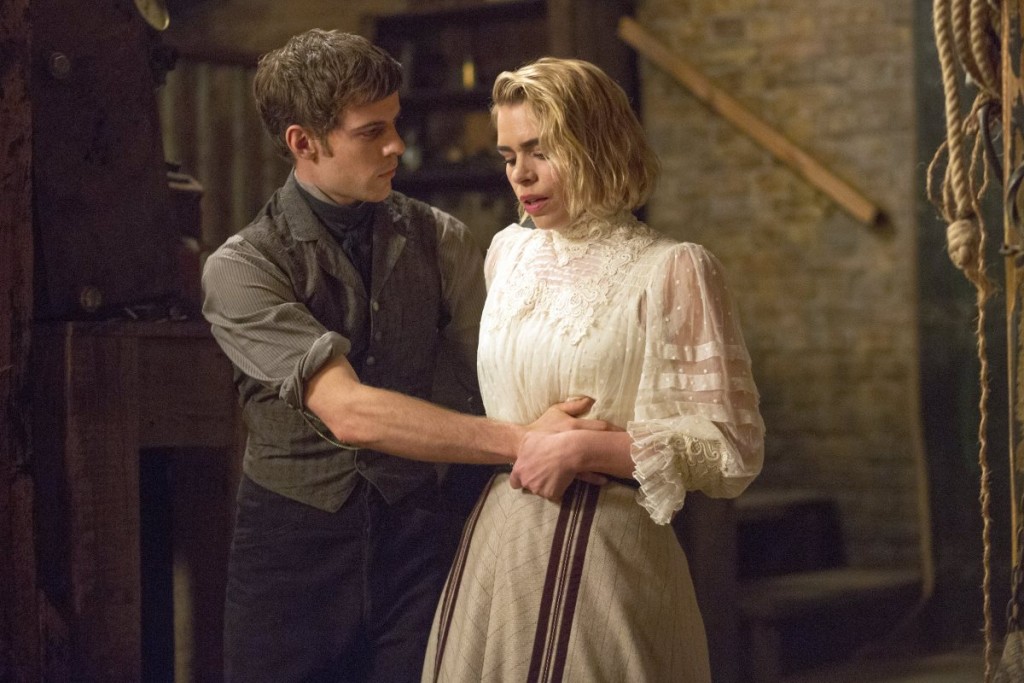
As Frankenstein prepares the corpse of Brona Croft (Billie Piper) for
reanimation, he begins to desire her. He strokes the soft curves of
her dead body. He fondles her lifeless breasts. Still a virgin, what
today might be called an incel, he flirts with necrophilia.
Brona has no memory after she is brought to life. Frankenstein tells
her that she is Lily Frankenstein, his second cousin. She lost her
memory in an accident, and Caliban (Rory Kinnear) was her intended.
Henceforth, she is called Lily.
Frankenstein grows possessive of Lily. He convinces Caliban to allow
Lily to stay with him for a bit, so that he might teach her how to
function in society. With Vanessa's help, Frankenstein buys dresses
for Lily. But Lily finds the corset constricting. Frankenstein jokes
that were women not restrained, they'd rule the world. He also assures
her that the outfit enhances her beauty.
"All we do is for men, isn't it?"
says Lily. "Keep their houses. Raise their children. Flatter them
with our pain."
Lily's remark reveals more than a desire for female emancipation. She
resents men. She says their
children, not our children. As if childbirth were a punishment
that men inflict upon women.
The lovesick doctor tells Lily to remove the corset. He has no desire
to cause her pain.
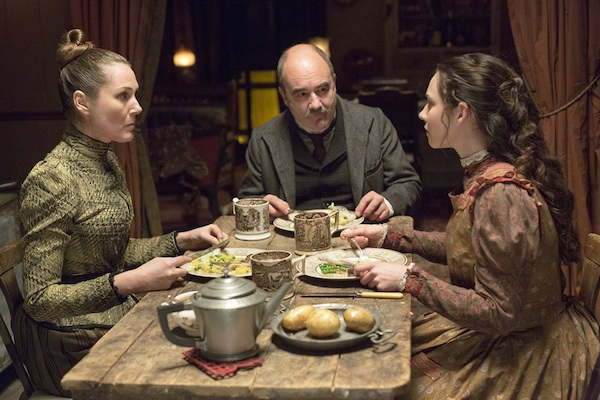
Having been fired from the Grand Guignol, Caliban finds a new job at
the Putney Family Waxworks. He tells the Putneys that his name is John
Clare. It is how he will henceforth be known. He begins to fall in
love with the Putney's daughter, Lavinia (Tamsin Topolski). She speaks
kindly to him. And because she is blind, Clare hopes that she might
love him despite his disfigured face.
Vanessa is shaken by the Nightcomers' attack. To help her find peace,
Sir Malcolm takes her to a soup kitchen for London's sick and poor. He
donates regularly and occasionally volunteers. There Vanessa likewise
finds peace. There she befriends John Clare. They share three scenes
in the soup kitchen over the course of Season Two, each a thing of
beauty and literary grace.
In the second scene, they discuss the difficulty of navigating love.
Clare says he recently met a woman yet is uncertain how to proceed.
Whether he means Lavinia or Lily is uncertain.
Although Clare claimed to be "modernity personified" to Frankenstein,
and expressed contempt for romantic poetry, he spoke from bitterness.
Clare yearns for beauty, romance, and pure, monogamous love. But
bitterness at not having these compels him to violence. And yet, he
is modernity personified. We moderns might yearn nostalgically for
a nobler past, yet we are physically trapped in a coarse
post-Christian world.
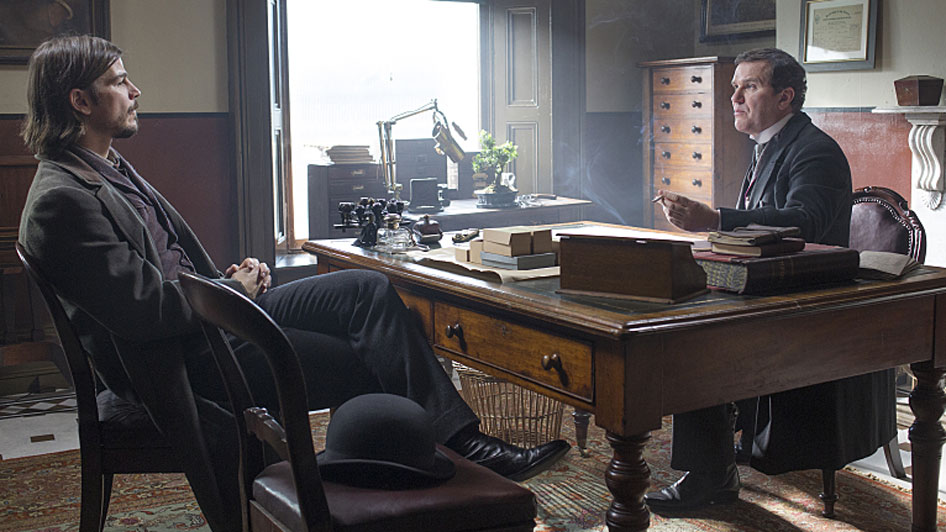
Inspector Bartholomew Rusk (Douglas Hodge) of Scotland Yard suspects
that Chandler was involved in the Mariner's Inn Massacre, as it's come
to be known. Rusk harasses Chandler for much of Season Two, seeking
evidence. Rusk is a noble figure. He lost an arm fighting the Boers in
South Africa, but he displays no self-pity.
Hecate Poole (Sarah Greene) likewise tries to insinuate herself into
Chandler's circle. Hecate is a Nightcomer. One of Madame Kali's
daughters. In her human form, Hecate stages a near accident, allowing
Chandler to rescue her from a runaway horse. She is savvy enough to
know that Chandler can't resist a damsel in distress.
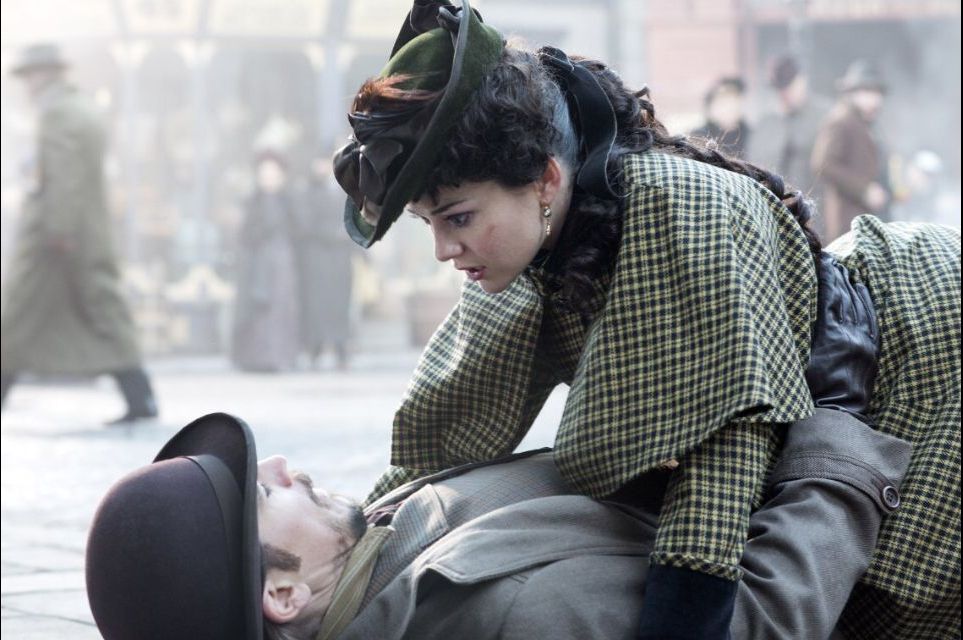
But not savvy enough to invent a convincing story. Over a meal,
Chandler sees her for a fraud (albeit not for a witch). Assuming that
his father hired Hecate to lure him back to America, Chandler
dismisses her, with an approving nod to feminism. "Maybe the
Pinkertons are hiring women now. If so, I applaud them for it, because
I am all for emancipation. My father failed with them and he failed
with you."
Continuing his investigations into ancient myths, Lyle discovers that
not one, but two chief devils -- brothers -- were evicted from
Heaven after Creation. Satan and Dracula. They are now fighting over
Vanessa. Whichever devil wins shall become Amun-Ra, and claim Vanessa
as his Amunet. Then the Apocalypse.
Lyle observes that many faith traditions posit an evil female figure
who brings darkness into the world.
"Something thought unholy in the erotic power they held over men,"
Sir Malcolm muses, reiterating the theme of sexual sin that runs
through
Penny Dreadful.
Lyle also discovers a medieval reference to Lupus Dei.
The Wolf of God.
He doesn't know how this Wolf figures into the Apocalypse, but
according to the source, Satan is obsessed with this Wolf. Even afraid
of it. Viewers can guess that it's not a wolf, but a werewolf.
Chandler.

Three Nightcomers invade Sir Malcolm's house. Chandler is shocked to
recognize Hecate among them, in Nightcomer form. Vanessa again speaks
the Verbis Diablo to expel them, but not before they steal a lock of
her hair. Presumably for a voodoo doll. But worse than that, Vanessa
is increasingly turning to sorcery to supplement her Christian faith.
Chandler encourages that. After the attack, he tells Sir Malcolm,
Vanessa, Sembene, and Lyle that while he was in the U.S. Army, he
helped eradicate an Apache tribe. They were defeated because they were
not prepared. Just as Sir Malcolm's household was not prepared for the
Nightcomers. That must not happen again. Chandler advises, "Sturdy
locks. And a shitload of weapons. Every weapon at our disposal. Every
superstition. Every ritual."
Chandler is advising religious
syncretism. The more gods, the better. In the following
montage, Sembene hangs African pagan totems in the kitchen. Chandler
burns Native American ritual incense and kneels in a Christian prayer.
Vanessa prays before a crucifix and draws a scorpion blood glyph on a
door. Lyle dons a Jewish prayer shawl. Sir Malcolm polishes guns in
the drawing room, adding secular firepower to the household's many
deities.
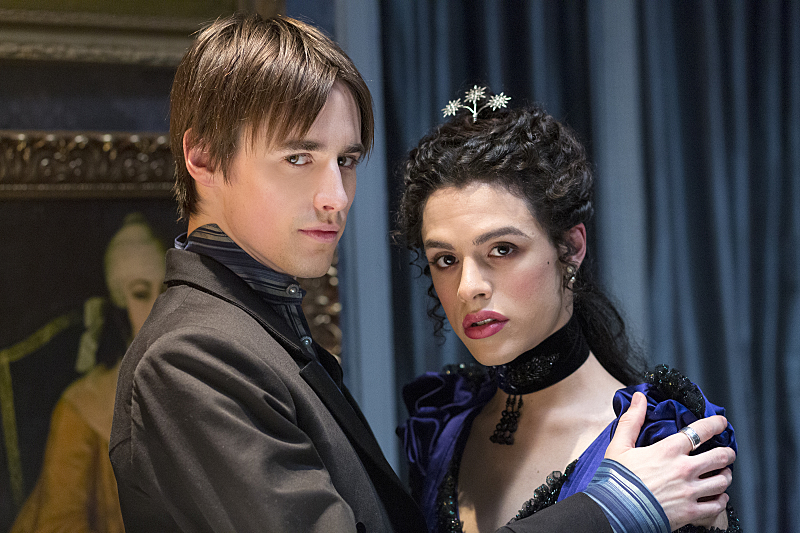
Having seduced both Chandler and Vanessa in Season One, Dorian Gray
(Reeve Carney) pushes the envelop with his new love, a transwoman
prostitute of color, Angelique (Jonny Beaucamp). However, Dorian will
prove yet again that he is incapable of loving anyone. He merely
revels in offending polite (Christian, patriarchal) society. "In
this house we celebrate the unusual. We set the tune and the world
follows. ... The thrill of the forbidden. There's nothing to match
that."
But at least for now, Dorian appears to have found a soulmate in
Angelique, who admits, "I live to shock."
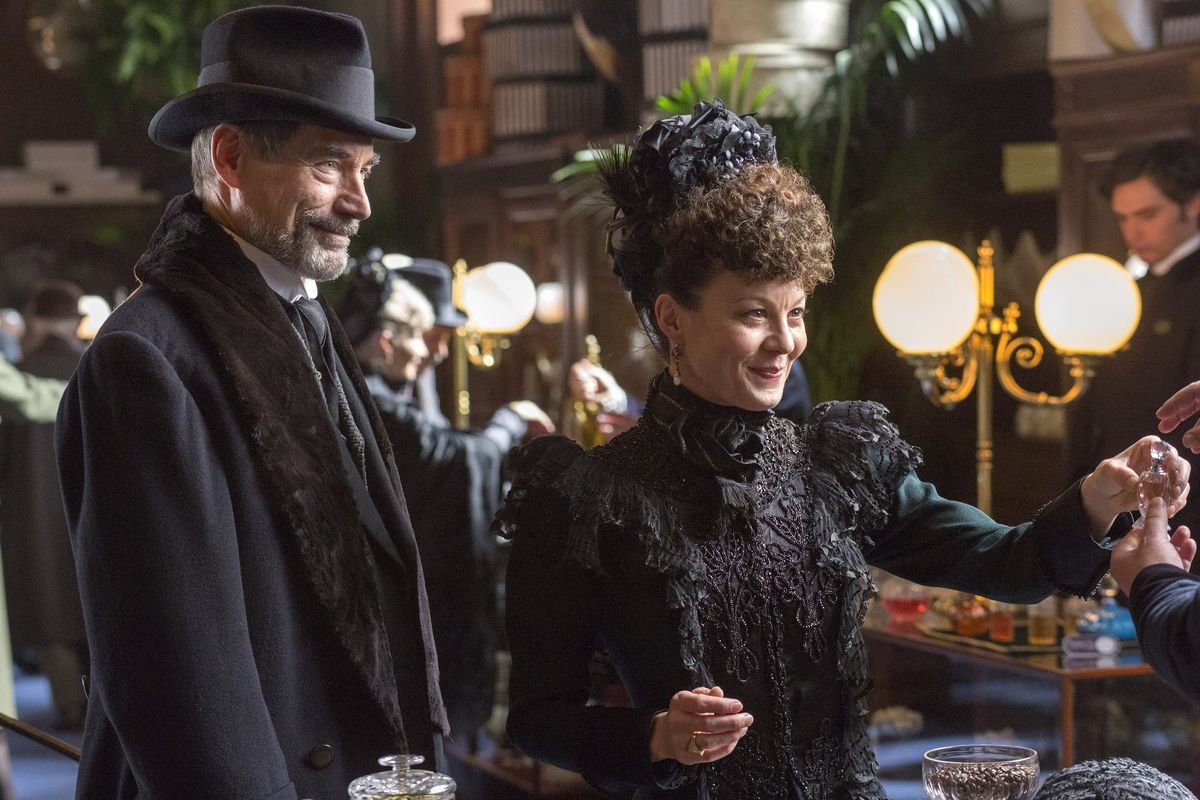
Determined to entice Vanessa to Satan, Madame Kali strikes up a
friendship with Sir Malcolm. She tells him that Madame Kali is her
stage name. Her real name is Evelyn Poole. (Many characters in
Penny Dreadful have multiple names.)
Sexual sin continues to corrupt. Episode Five ends with a montage of
three sinful encounters (plus one temptation), put to foreboding
music, as if the participants are courting doom. Frankenstein beds
Lily, an act of both fornication and necrophilia. His morphine
addiction will worsen. Dorian sodomizes Angelique. Their relationship
will end in murder. Sir Malcolm commits adultery with Kali. During
their lovemaking, Kali's spell drives Sir Malcolm's wife to suicide.
During this night of sexual sin, Vanessa and Chandler pass in the
hall. They eye each other, aroused. Yet restrain themselves. Vanessa
has learned in Season One that illicit sex opens her to Satan.
Sir Malcolm returns the next morning, so enchanted by Kali that when
he learns of his wife's suicide, he is mostly concerned about his
wife's blood ruining the carpet.
Vanessa is shocked. Chandler dismisses it, observing that Sir Malcolm
had long been estranged from his wife.
"Not every death is the tragedy we think it should be." But
Sembene realizes that Sir Malcolm is under a spell. "This is not
him."
Kali returns to her castle with a lock of Sir Malcolm's hair,
attaching it to his fetish doll. Just as she did with Vanessa's hair.
Kali has a large collection of fetish dolls. Each contains the heart
of an infant. At Kali's bidding, Hecate murders a couple and steals
their baby. Kali extracts the baby's heart for Vanessa's doll.
Like Vanessa, Lyle is guilty of dabbling in the occult. He ignored
Deuteronomy's warning that "The secret things belong to the Lord."
In Season One, he hired Kali to entertain his guests with a
seance. Now Kali tells
him, "You thought me a fraud at first, albeit a terribly good one.
A theatrical spiritualist beyond compare, n'est-ce pas? But then the
occultist dabbler found himself amongst the real thing."
Viewers of
Penny Dreadful have long surmised that Lyle is gay. His marriage
to a wealthy woman is one of convenience. We now learn that Kali has
photos of Lyle's "sodomite encounters" and is black-mailing him.
Actually, Lyle is a double agent. He wants to help Vanessa, yet spies
on her for Kali. A tragic figure, he wants to do right, but his sexual
sins and occult games have led to moral corruption: betrayal of
friends and servitude to Satan's witches.
Dorian throws a "coming out" ball to honor Angelique. Dorian is also
fickle. At the ball, he steals Lily away from Frankenstein. Dorian
recognizes Lily as the dying prostitute who thrilled him by coughing
up blood on his face in Season One. When her name was Brona.
Sir Malcolm attends the ball with Kali. As do Hecate and her two
sisters. They stalk Vanessa, who has visions of blood. Visions of the
Apocalypse she will usher in as Amunet. Then Vanessa faints.
Chandler doesn't attend the ball. It's the night of a full moon. He
asks Sembene to chain him in the basement. Chandler doesn't know that
he's a werewolf. Only that he has blackouts and when he awakes,
"There's usually blood." He wants Sembene to observe and discover
what occurs during his blackouts.
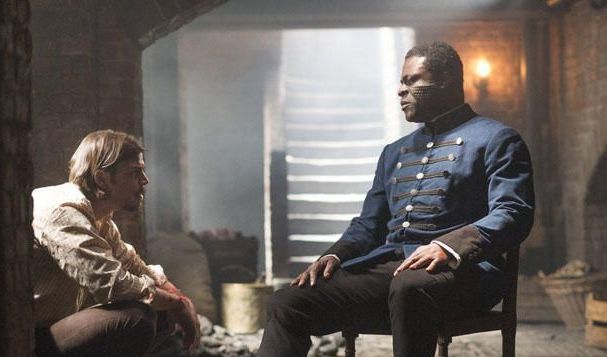
The next morning, Sembene tells Chandler, "The Shamans in my
mountain call it Uchawi Mabadiliko. The changing from one skin into
another. The ones so cursed do not always fully remember it, this ...
becoming. Is it a sickness? Or is it something else? Is it a blessing,
the purpose of which we cannot yet see? I say this is what it is. For
I know you, my friend, Ethan Chandler."
Like Vanessa, Sembene believes
that God has a plan. And like everyone else, Sembene has sinned. "I
have been much feared and hated in my life. By my people. By yours.
These marks mean I was a slave trader. This is my sin to live with."
He is also the ultimate syncretist. "I believe in everything."
Vanessa didn't see the Nightcomers at the ball, but she sensed their
presence. Believing herself unsafe in London, she returns to Clayton's
cottage on the moors. Chandler comes with her, both to protect her and
to hide from Inspector Rusk.
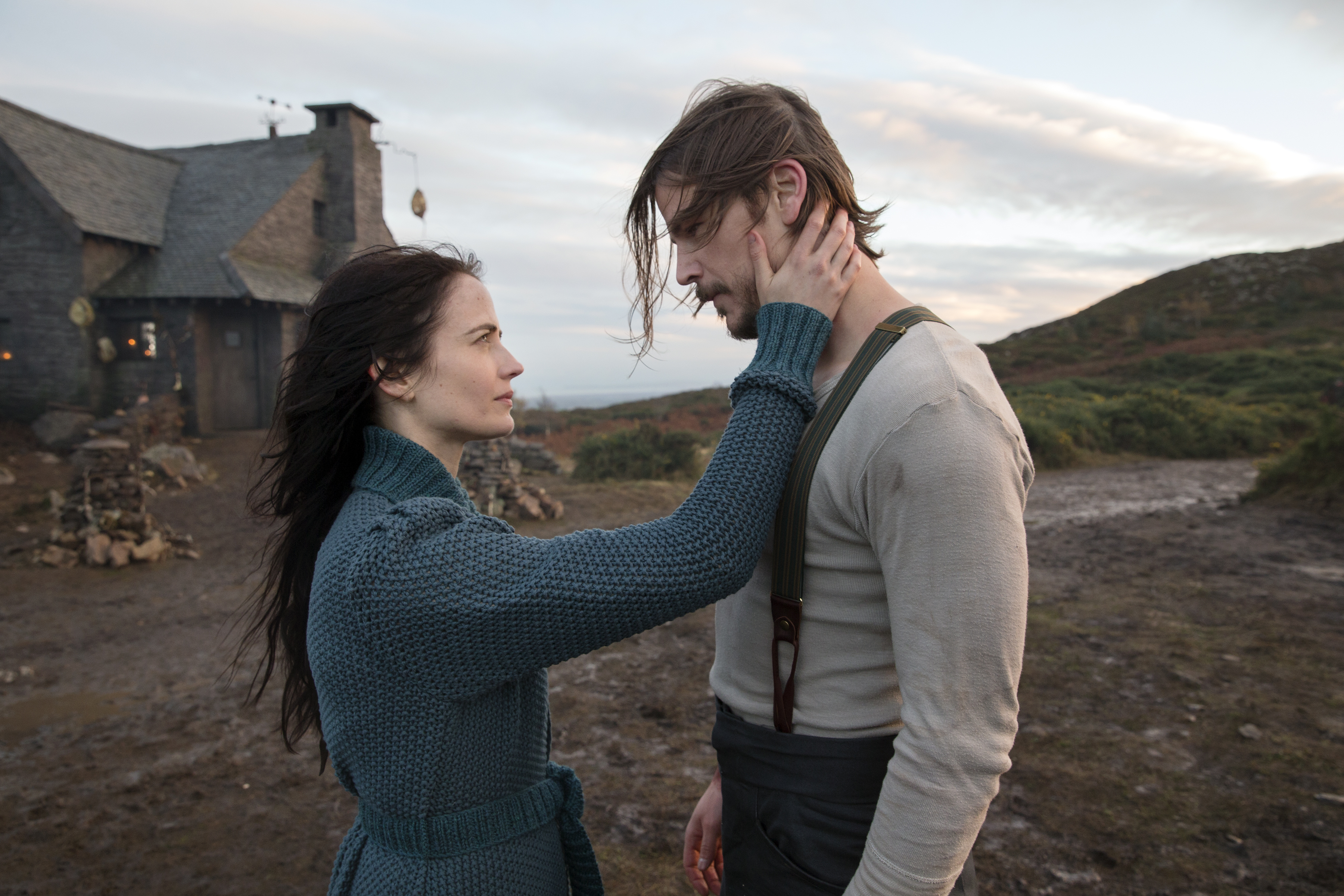
While sharing a marijuana joint (a habit she frequently indulges),
Vanessa and Chandler discuss their need to restrain the "monsters" and
"demons" inside themselves. What happens when they're released? asks
Chandler. "We're most who we are,"
says Vanessa. "Unrestrained. Ourselves."
Vanessa identifies her sinful desires with her true self, which must
be restrained. This challenges the modern view that people should
always "be themselves." She is espousing traditional Christianity. The
belief that human nature is evil. Man is fallen. His
natural
inclinations lead to sin, and thus natural human desires must
be restrained. Despite her sins, there is hope yet for Vanessa.
Chandler knows of Vanessa's past possession. Vanessa doesn't know that
Chandler is a werewolf, but she senses a darkness in his past.
"Whatever you have done... whoever you have made yourself... I'm here
to accept you. We're together for a reason."
But that doesn't include sex. It nearly does, one dark and stormy
night. But Vanessa breaks off at the last moment. "No! We are
dangerous!" She restrains her natural desires because, for her,
fornication opens the door to Satanic possession.

Yet Vanessa succumbs to worse temptation after running into Sir
Geoffrey, still the arrogant patriarchal caricature. His attack dogs
menace Vanessa and Chandler. Sir Geoffrey gleefully explains that he
uses starvation to train them. He gloats at having burned Clayton and
branded Vanessa.
Enraged, Vanessa opens Clayton's book of Satanic spells. The one
Clayton warned against. "If her God deserts her completely, only
then does she open it. And on that day, she will never be the same.
She will have gone away from God. Forever."
Trying to save Vanessa's soul, Chandler plans to shoot Sir Geoffrey
before Vanessa can act. But he fails. Vanessa's spell beats Chandler's
bullet to the kill.
Chandler returns to the cottage, feeling despair and disgust. "Do
you feel better now? Now that you're a murderess? I suppose that's
what you learned here, isn't it? From your nice old lady friend. How
to kill babies. How to kill men. You do belong here. ... You'll never
get your soul back. Not ever. Do you understand that?"
"Yes."
Vanessa appears shaken, but accepting
of her fate. She succumbed to the temptation of revenge, rather
than trusting God to dispense justice at some future date. Satan will
use this against her. Even so, Vanessa still prays to God, hoping for
forgiveness and redemption.
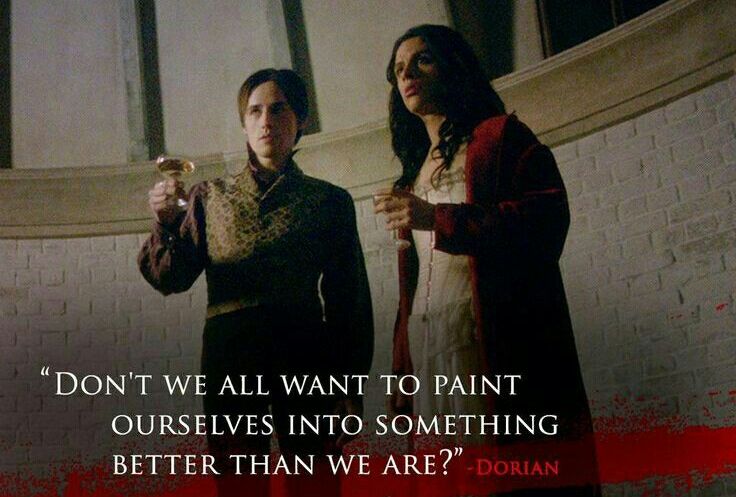
Back in London, Angelique discovers Dorian's portrait. The portrait
that keeps him young. That depicts his true, hideous soul. Despite
having professed his devotion, Dorian murders Angelique. He shows no
remorse. He is already courting Lily, much to Frankenstein's
displeasure.
Clare sees Lily with Dorian, and becomes enraged. Lily was meant for
him. In their past conversations, Lily played the Nice Girl. She told
Clare that, because she had no memory of their courtship, she wished
to move slowly. Be friends at first. Now Clare sees that Lily only
wanted to go slow with him. She's quick to date other, better looking
men.
Clare breaks into Frankenstein's lab to confront Lily. He intends to
force her into being a faithful, loving, traditional wife. But Lily
too is Frankenstein's creation. She too is modernity personified. A
liberated woman. She mocks Clare's ugly face and love of poetry.
"Don't we make a beautiful couple, thee and me? Shall we wander the
pastures and recite your fucking poetry to the fucking cows? You are
blind, like all other men."
When Clare attacks Lily, intending to discipline her like a wayward
wife, she overpowers and shoves him to the ground. Then reads him the
riot act.
"We flatter our
men with our pain. We bow before them. We make ourselves dolls for
their amusement. We lose our dignity in corsets and high shoes and
gossip and the slavery of marriage. And our reward for this service?
The back of the hand. ... Never again will I kneel to any man. Now
they shall kneel to me."
More than any character in
Penny Dreadful, Lily embodies radical feminism. Marriage is
"slavery." Even equality is not enough. She yearns to rule men.
Lily reveals that she long ago regained her memory. She knows that she
and Clare are the immortal dead. She now seeks to enlist Clare as an
ally. Knowing that he wants a woman, she says, "I'll bring you a
dozen. We'll fuck 'em together."
But that's not what Clare wants. Yet Lily, the former prostitute, is
too crude, cynical, and broken to realize that. She says they should
kill Frankenstein, and then, "We were created to rule, my love. And
the blood of mankind will water our god. Us and our kin and our
children and our generations. We are the conquerers. We are the pure
blood. We are steel and sinew both. We are the next thousand years. We
are the dead."
Like Nietzsche, Lily is calling for a new god to replace the Christian
God. A god of the "pure blood" who will rule for "the next thousand
years." She has supplemented her radical feminism with National
Socialism. (Well, Planned Parenthood founder, Margaret Sanger, did
advocate for eugenics.) As Satan and Dracula prepare for the
Apocalypse, modernity is pushing Christianity off the stage, making
room for the secular revolutions of the 20th century. What do they
offer? Lily tells us. "We are the dead."
The scene is brilliant -- thematically, aesthetically, and
psychologically. As Lily, Billie Piper traverses a long character arc
and wide emotional range. From frightened of Clare, to mocking him,
raging against him and all men, and finally, wooing him as "my love"
in an attempt to recruit him for her revolution.
Yet despite these contradictory emotions, Lily is psychologically
consistent. A former prostitute, she is deceitful. Skilled in
manipulating men by feigning fear, promising love, or using anger,
mockery, and false praise.
Lily is also a fickle, hypergamous female. She loses interest both in
killing Frankenstein and enlisting Clare when she learns that Dorian
too is immortal -- and rich and handsome (unlike Clare). Lily makes
the same offer to Dorian, that they spawn a race of immortals to rule
the world. She also demands that he kneel before her. Dorian, having
never met so strong a woman, and always eager for new erotic thrills,
happily submits to Lily's sexual domination.
Clare is repelled by Lily's evil, yet he craves companionship. Not
knowing that she has dropped him, he ponders her offer, telling
Putney. "True evil is above all things seductive. When the devil
knocks at your door, he doesn't have cloven hooves. He is beautiful
and offers you your heart's desire in whispered airs. Like a siren
beckoning you to her ruinous shore. You save your soul or you give it
to her."
Clare chooses his soul. He decides against Lily. But he has hopes for
Lavinia, who tells him. "You are my true friend." Alas, it was
a ruse. She tricks Clare, trapping him in a cage. The Putneys plan to
open a freak show to complement their horror waxworks. Clare is to be
their first exhibit. But he breaks free of the cage and murders the
Putneys. He spares Lavinia.
After Sir Malcolm breaks free of Kali's spell, he laments the
destructiveness of unbridled erotic love.
"This thing divorces us from our wits and our dignity. Our purest
instincts are undone. We become strangers to ourselves." Loading
his gun, he goes to Kali's mansion, seeking revenge. Instead, he is
captured by Kali's Nightcomers. Kali plans to use Sir Malcolm to lure
Vanessa.
Vanessa and Chandler do indeed return to London to save Sir Malcolm.
Chandler warns Vanessa not to go at night, when Nightcomers are most
powerful. He reminds her of their capabilities.
Vanessa replies. "And you, Mister Chandler, know exactly what I'm
capable of. This is my work now. For it is not a battle of firearms.
It is a battle of faith. And yours is not strong enough."
It's a curious and confusing statement. Chandler knows Vanessa was
capable of murdering Sir Geoffrey with a Satanic spell. Yet she
seems to be referring to her Christian
faith.
Having lost Lily to Dorian, Frankenstein's morphine addiction worsens.
Vanessa tries not to judge as she watches him shoot up, acknowledging
her own use of pot.
Frankenstein regards drugs as a modern substitute for God.
"Scientifically speaking, life's nothing but a series of chemical
reactions. So, to accelerate or decelerate that process is of no great
matter. It gives us that illusion of power in a life with little, does
it not? And yes, it becomes an addiction, this seeking transcendence.
Much like your addiction to God."
"I'm sorry she hurt you," says Vanessa. "I'm sorry you feel
so unloved."
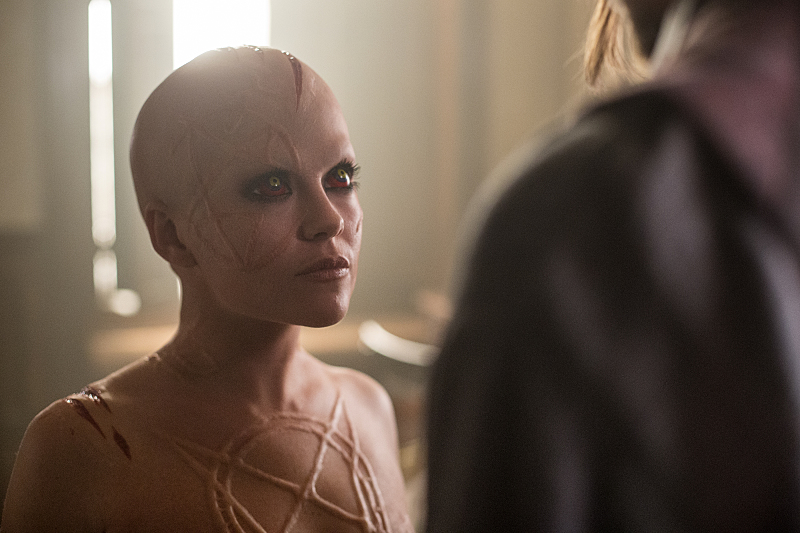
Hecate surprises Chandler in his room. She comes with an offer.
According to prophecy, Amunet will choose Satan or Dracula as her
consort. The pair will then begin the Apocalypse by attacking God. But
Heaven has its champion in Chandler -- Lupus Dei -- empowered
to destroy the evil couple.
Hecate urges Chandler to switch sides and "to serve not the
emaciated Galilean God, but to stand alongside the great winged
Lucifer as he reconquers Heaven's bloody throne. You have been given a
great power. One day you will use it and take your foretold place over
these mortal animals." When he is ready to defect, says Hecate,
"I will be your greatest ally."
She is both jostling for position and hedging her bets. She had been
undermining her mother's authority throughout Season Two. Hecate is
both envious of Kali and thinks (and hopes) that her plans will fail.
After which, Chandler's defection will win Hecate a promotion over
Kali in Hell's hierarchy, and a powerful lover to boot.
In
The Screwtape Letters, C.S. Lewis describes Hell as a place ruled
by fear and torment, the demons always conspiring against one another.
Kali and Hecate are mother and daughter, united in service to Satan,
yet each would happily destroy the other.
Back at her mansion, Kali likewise urges Sir Malcolm to switch sides
and betray Vanessa. When he refuses, Kali implies that Vanessa is Sir
Malcolm's illegitimate daughter. "I suppose I shouldn't be
surprised of your tiresome obsession with Miss Ives. You're so very
close, after all. You knew her when she was born, didn't you? ... You
saw her grow into the fine young woman she is. ... You watched her
rather carefully, I'd say. ... She was always your favorite. It's good
we care for our daughters."
Kali's intimation sheds new light on Sir Malcolm's reference to
Vanessa -- "I already have a daughter."
-- at the end of Season One. And we know he was having an
adulterous affair with Vanessa's mother. If Vanessa is a product of
sin, it explains why Amunet choose her as the vessel for
reincarnation. Satan prizes defrocked priests. Amunet likely values a
devout Catholic born of adultery.
Chandler thinks he convinced Vanessa to wait until morning to rescue
Sir Malcolm. But Vanessa leaves without telling anyone. When they find
her gone, Chandler, Sembene, Frankenstein, and Lyle go after her.
At the mansion, Hecate traps Chandler and Sembene in a stairwell.
Sensing he is turning into werewolf, Chandler is about to commit
suicide to save Sembene. But Sembene stops him. "No. I am just a
man. You have been chosen by God." Thus does Sembene sacrifice his
life, both for Chandler and for God's plan.
Satan also tries to drive Sir Malcolm and Frankenstein to suicide,
showing them images of their past sins, the people they have killed,
the monsters they have created.
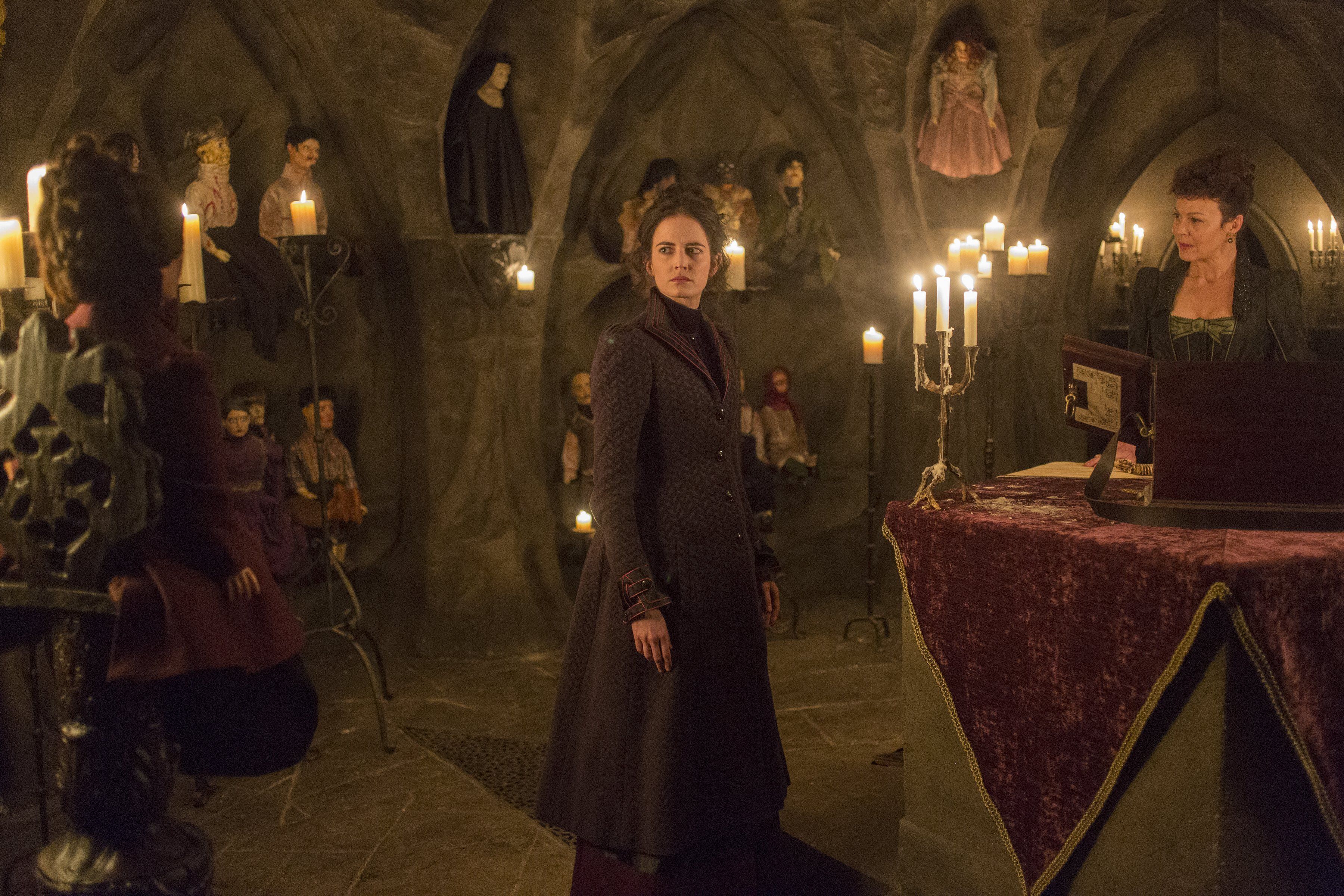
Kali takes Vanessa to her room of fetish dolls. Satan speaks, in
Vanessa's voice, through the doll made in her image. He tempts Vanessa
with a normal life. A happy marriage to Chandler, beautiful children.
A happy illusion, after which she will die and be his bride.
Satan also tries to undermine Vanessa's faith with guilt, accusing her
of murder. Kali adds, "You claim to stand with the angels, while
your every action speaks otherwise."
Satan says, "There is no more powerful inducement to me than this.
Know yourself."
Yet Vanessa uses those words against Satan. She is resigned to having
lost her soul, but if she is to be damned, she will be damned on her
own terms. "You offer me a normal life. Why do you think I want
that anymore? I know what I am."
She then speaks the Verbis Diablo, defeating Satan with his own black
magic.
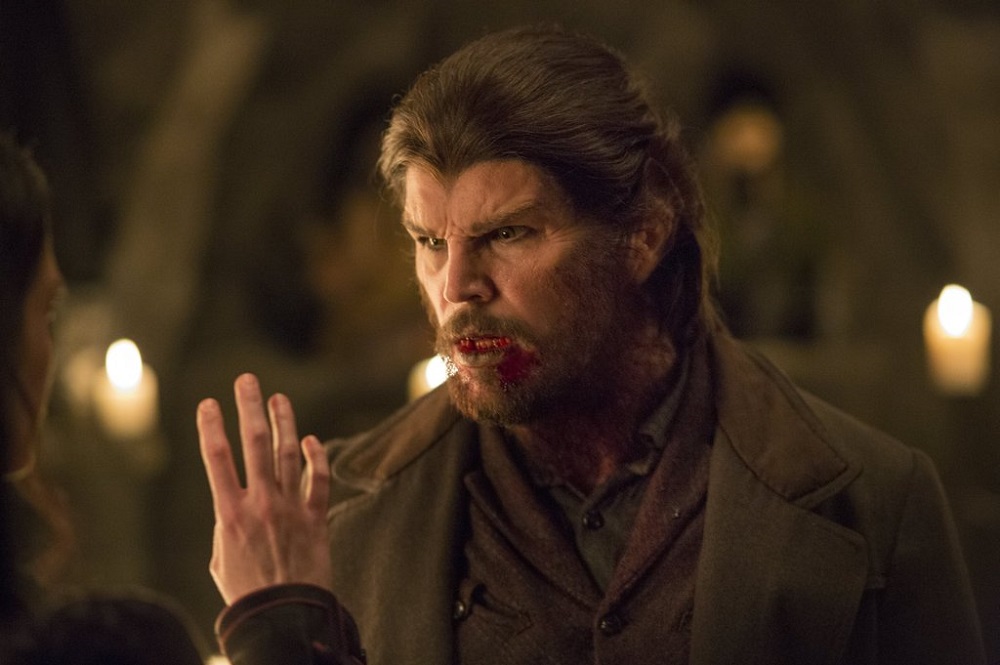
Seeing Kali defeated, Hecate releases Chandler from the stairwell. The
Wolf of God kills Kali. He is about to kill Vanessa, then stops.
Recognizing either Vanessa or Amunet. Vanessa recognizes Chandler,
realizing his dark secret. She reaches out to touch him, but Chandler
rushes from the room.
Feminist fans have praised Vanessa as a woman "too strong for Satan,"
but it would be a mistake to credit any mortal with the strength to
defeat Satan. Vanessa is the reincarnation of Amunet, a fallen angel
empowered to choose or reject Satan or Dracula. It was Amunet, not "a
strong woman," who defeated Satan in this encounter.
Nor does Vanessa celebrate her "empowerment." She is distraught over
using the Verbis Diablo, rather than faith in Christ, to defeat Satan.
She despairs of ever regaining her soul.
In their third encounter, she bids good-bye to Clare in the soup
kitchen, believing there is no place for her among normal people.
Clare is likewise leaving London. Having failed with both Lily and
Lavinia, he sees himself as unfit for human company. He asks Vanessa
to join him. She declines, but leaves him with a kiss. "I think you
are the most human man I have ever known," she tells
Frankenstein's monster.
Season Two ends with everyone dispersing across the globe. Believing
himself damned, guilt-ridden over killing Sembene, Chandler turns
himself in to Rusk, confesses to the Mariner's Inn Massacre, and
requests a quick hanging. He is instead extradited to America to face
other criminal charges. Sir Malcolm leaves England to bury Sembene.
"I'll bring him home to Africa from whence I should never have brought
him. Let him lie in his native earth."
Having lost Lily to Dorian, Frankenstein escapes into addiction,
barely able to find a vein that hasn't collapsed. As in Mary Shelley's
novel, Clare sails for the Arctic Ocean.
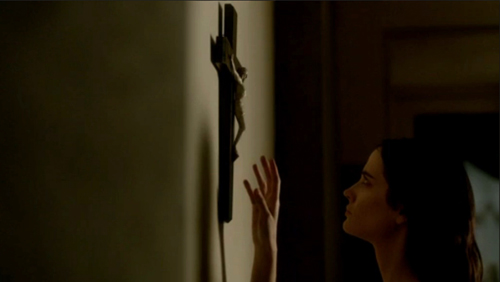
In a powerful final scene, Vanessa takes down the crucifix she has so
long prayed to, and puts it in her burning fireplace. She gazes out
into the night. "So we walk alone."
Yet the Apocalypse draws near. In Season Three,
Dracula and Satan will make their final bids to win Vanessa, and she
will, perhaps, have a chance to regain her soul.


|
